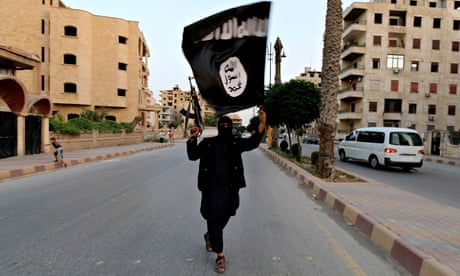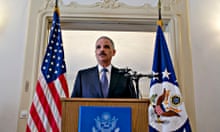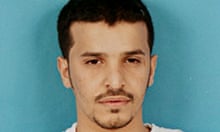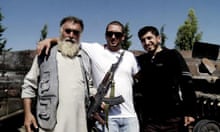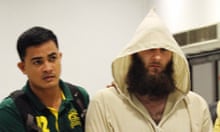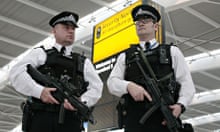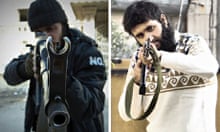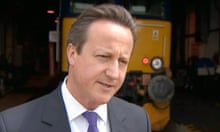A Briton who claims he has been fighting alongside jihadist militants in Syria has told the BBC he would not return to the UK until he could raise "the black flag of Islam" over Downing Street and Buckingham Palace.
The comments were broadcast as religious leaders called on British Muslims not to travel to Syria and Iraq, amid fears of jihadists fleeing the country to take part in terrorism.
An open letter signed by more than 100 imams from across major theological backgrounds and cultural groups has urged British Muslim communities "to continue the generous and tireless effort to support all of those affected by the crisis in Syria and unfolding events in Iraq", but to do so from the UK "in a safe and responsible way".
The letter comes during the Islamic fasting month of Ramadan, but against a backdrop of tensions between the Middle East and the west.
The situation has been underlined by US officials who have stepped up security precautions amid reports that two terror networks were working together on a bomb that could evade existing measures.
Concerns have also been raised about homegrown involvement in terrorism after Britons appeared in a propaganda video for insurgent group Islamic State in Iraq and the Levant (Isis).
Among them was aspiring jihadist Aseel Muthana, who told the BBC he was fighting in Syria and had no intention of returning to the UK.
His brother Nasser appeared with two other British men – 20-year-old Reyaad Khan, from Cardiff, and Abdul Raqib Amin, who grew up in Aberdeen – in an Isis propaganda video.
BBC5 Live broadcast an interview with a man calling himself Abu Osama, whose accent suggests he comes from the north of England and who claims to have been fighting for the establishment of a caliphate – which he referred to by the Arabic term khilafah – across the Islamic world. His claim to have been taking part in military training, making bombs and fighting with the extremist al-Nusra Front, which is linked to al-Qaida, for the past year has not been verified.
The man told interviewer Nicky Campbell: "I have no intention of coming back to Britain because I have come to revive the Islamic khilafah. I don't want to come back to what I have left behind. There is nothing in Britain – it is just pure evil.
"If and when I come back to Britain it will be when this khilafah – this Islamic state – comes to conquer Britain and I come to raise the black flag of Islam over Downing Street, over Buckingham Palace, over Tower Bridge and over Big Ben."
The man said he initially faced opposition from his family over his decision to go to Syria. "At first it was hard for them to accept, because no mother wants to lose her son. But I send them photos and I speak to them about the situation, and now they can understand that this is a good cause I am in," he said.
"They are a bit scared but I tell them we will meet in the afterlife. This is just a temporary separation. They said, 'We understand now what you are doing', and my mother said, 'I have sold you to Allah. I don't want to see you again in this world.'"
The imams' open letter read: "As the crisis in Syria and Iraq deepens, we the under-signed have come together as a unified voice to urge the British Muslim communities not to fall prey to any form of sectarian divisions or social discord.
"Ramadan, the month of mercy, teaches us the value of unity and perseverance and we urge the British Muslim communities to continue the generous and tireless efforts to support all of those affected by the crisis in Syria and unfolding events in Iraq, but to do so from the UK in a safe and responsible way."
In April, the Metropolitan police issued a plea for people to come forward with information about their family members if they were concerned about them joining terrorist training camps in Syria.
Qari Mohammed Asim, imam at Leeds Makka Mosque, who played a key role in organising the letter, said: "The scale of the humanitarian disaster in Syria and the escalating violence in Iraq calls for an unprecedented response.
"As we near the end of the first week of Ramadan our message is simple – we have come together to urge British Muslim communities not to fall prey to any form of sectarian divisions or social discord.
"Here in the UK we are Sunnis and Shias, brothers in Islam – and brothers in Britain too. The conflict in Syria and Iraq can never change that, no matter how bitter the fighting.
"We urge members of the community to echo this sentiment by adding their signature to this letter, joining the many others that have done so already."
